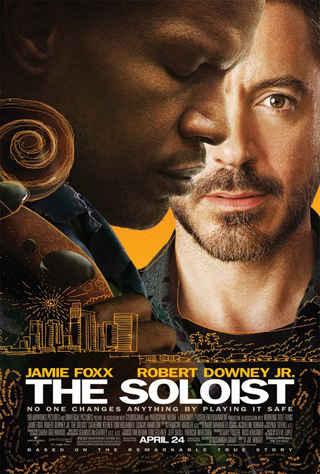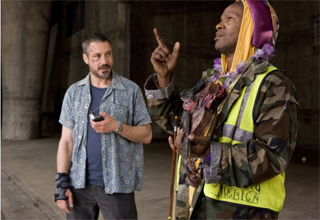|
The
Soloist
For actors, the appeal of The Soloist
is obvious. Two men, trapped inside their own heads, find
a strange kinship in one of the worst parts of Los Angeles.
One suffers from imaginary voices leading him astray, one
from his enormous ego. In other words, typecasting.
Except that Robert Downey, Jr. plays the
overweening Steve Lopez and Jamie Foxx plays the tormented
Nathaniel Ayres. Despite the subject matter providing easy
bait for Oscar, that shouldn't lessen the solid performances
both men give in Joe Wright's film. They both slide easily
into the skins of their characters.
For all that, The Soloist doesn't
have the rhythm of the kind of movie awards fall over. All
the notes are there, but Wright doesn't conduct Susannah
Grant's script into the kind of symphony that fills us with
laughter and tears. It's just a pleasant enough piece that
looks matter-of-factly at a year in the life of these two
men.
Not that Wright doesn't try to push it.
From the beginning we see Downey's character as literally
bruised and banged up (after a bicycle accident) as the
newspaper he works for is metaphorically. He's disconnected
from the culture he writes about as a columnist for the
L.A. Times, not interested in getting to know his neighbors
and working under an editor who was once his wife, played
by Catherine Keener.
Until he meets Jamie Foxx's Nathaniel,
in fact, we're meant to believe that Lopez writes fluff
in his column. But at least the fluff connects with people
in a way he can't.
Of course, Nathaniel can't connect, either.
Tormented by schizophrenia, the once-promising Juilliard
student now plays a violin with only two strings that he
keeps in his shopping cart full of useless treasures (including,
none-too-subtly, two palms as one might find during the
Easter season of Jesus' rebirth).
When Lopez discovers that Nathaniel did
indeed attend Juilliard, he dedicates a column to him. One
reader is so moved that she donates her cello, which was
his original instrument of choice before succumbing to mental
illness.
From there, we get very predictable set-pieces.
Keener has one of her trademarked drunken scenes in which
she publicly spells out all the flaws in Lopez' character,
just in case we didn't get it. Nathaniel experienced a very
distanced racism as a child - though there's no way that
really connects to his eventual mental illness.
A well-meaning symphonic cellist (Tom Hollander)
keeps doing all the wrong things in dealing with Nathaniel,
probably because he's a fervent Christian. (His attempts
to "subtly" convert Nathaniel blind him to the cues that
it's not working.) And of course, when Nathaniel hears Beethoven,
he is transported, and watching him, Lopez realizes, is
watching someone touch God. Oh, if only that cellist had
shut up long enough to join Lopez in his epiphany!
Instead of an original work, there it becomes
very paint-by-numbers. But when Wright deals more matter
of factly with his subject, The Soloist becomes,
if not affecting, fairly interesting.
Dropping its bombast, the film delineates
how frustrating and devastating schizophrenia can be, to
both sufferer and those that try to help him. Its changes
are unpredictable, and therefore they have to live with
it instead of trying to resolve it. An odd message for a
Hollywood portrayal, perhaps, but an accurate one, and Wright
and his creative team should be commended for it.
At times it even becomes almost documentary,
as Wright uses many street people as characters in Skid
Row. Without hammering it home, the film shows a multitude
of sufferers, and that they need to be treated with a dignity
few of us seem willing to offer.
Those subtle moments also extend to the
acting. What makes Downey so compelling is that he can handle
being matter of fact and still hold our attention. We can
see him thinking. Foxx doesn't do quite as well, as it's
clear that he's chosen to make external choices in wardrobe
and make-up to remind us how loud the voices are for Nathaniel
at all times.
Yet Wright makes the overall portrayal
work, to the detriment of his subplots. If Wright meant
to make some larger point about the death of journalism,
it must have been cut. Thus Stephen Root, one of the best
character actors working today, seems like he's subbing
in from some other film.
So we can cut bait on this one come Oscar
time. It still has an honesty that works, but even a seasoned
journalist like Steve Lopez would know that sometimes the
truth just isn't as colorful as we want it to be.
|








